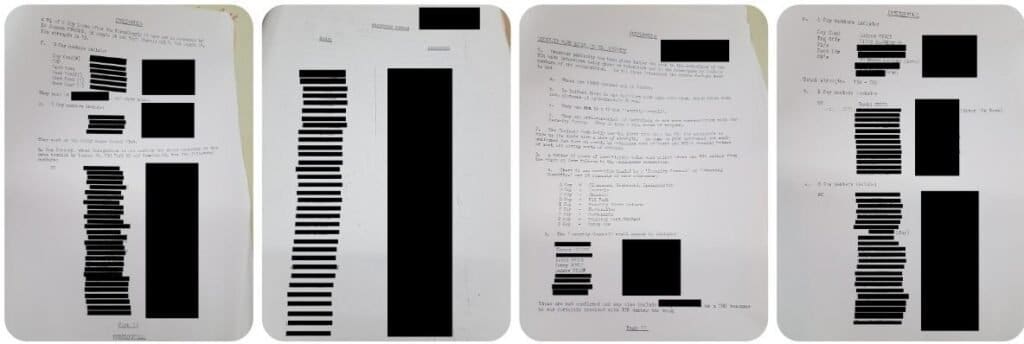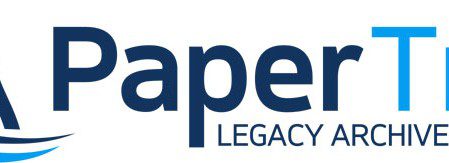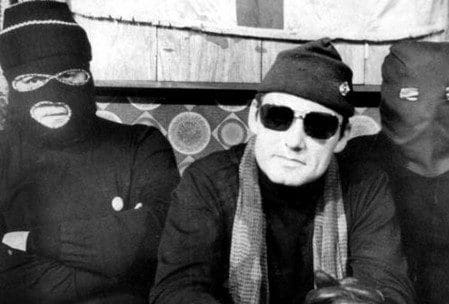Britain’s failure to proscribe Loyalist extremist groups will feature in legacy court cases for years to come.
Britain, of course, also stands accused of arming and funding Loyalist extremist groups during the conflict, but its failure to proscribe these from the start will be tested by litigation too.
The British state’s defence that it was unaware that organised Loyalist violence existed or that Loyalist extremists used cover names for their violence has long been proven untenable. It is moot, though, whether the British state has been properly held to account.
For my first book in 2012, The McGurk’s Bar Bombing, my research focused on the failure to proscribe Loyalist extremist groups in the period between Internment in August 1971 and February 1973 when the first alleged Loyalist extremists were interned. By then, Loyalist extremists had killed around 120 civilians, including 15 civilians in McGurk’s Bar on 4th December 1971.
I am re-writing and updating this study this year
Intelligence Summaries (INTSUM)
Since 2014, Paper Trail has retrieved critical British Military Intelligence files from the early 1970s in the National Archives (TNA) which prove that the British Armed Forces had compiled an extensive list of alleged Loyalists – including their names, ages and addresses.
The unredacted lists from British Army Intelligence Summaries contain the details of hundreds of alleged Loyalists at every level – from Tartan Gang members up to Security Council – broken up geographically and by each Belfast UDA Company.
They feature now well-known Loyalist leaders such as Andy Tyrie, Billy McQuiston, Tommy Herron, Davy Payne and Davy Fogel as well as young, alleged Tartan gang members.
British Military Intelligence records how it has compiled such an extensive list:
“The leaders are comparatively open about their organisation and consequently a large number of names have been forthcoming. They state that there is nothing illegal about their activities although there are undoubtedly weapons close at hand.”
It then records:
“The Security Council [sic] contains most of the Company Commanders and is the hard core responsible for training and supplying weapons.”
In the same Paper Trail files, British Military Intelligence not only documents the alleged Company and Security [Inner] Council formations of UDA, but also writes:
“The Security Council contains most of the Company Commanders and is a hard core repsonsible for training and supplying weapons.”


These particular British Army Intelligence Summaries (INTSUM) begin in May 1972 and cover the most violent weekend since the imposition of Direct Rule a few weeks before. They openly discuss Loyalist murder and mayhem.
Thereafter began the swift descent towards the most violent month of the conflict in July 1972 when 95 people lost their lives and hundreds were injured.
All sides were guilty of the carnage.
At the time, though, the British state only interned Irish Catholics and the UDA remained legal until it was finally proscribed 20 years later in August 1992. By then it had murdered over 300 people, the majority of them Irish Catholic civilians in [random] sectarian attacks.
Anti-Terrorist
One particular mass rally at Woodvale Park in May 1972 provided British Military Intelligence with a wealth of information where:
“As many as 2000 uniformed and semi-uniformed men were on parade by Companies with officers and NCOs [Non-Commisioned Officers] wearing badges of rank and giving words by command.”
“… items of intelligence value were gained about the UDA either from the march or from talking to the organisers themselves..”
British Military Intelligence then records that interviews that week stressed that “they are anti-terrorist and definitely do not want confrontation with the Security Forces” but “they do have a wide range of weapons”.
The Blame Game
In 1972, the British and Northern Irish Governments not only denied the existence of organised Loyalist violence but even blamed Loyalist atrocities like the McGurk’s Bar and Kelly’s Bar Massacres on Irish Republicans.
The British Armed Forces at this time also had an active Arrest Policy for Protestants [discovered by Pat Finucane Centre]. It dictated that:
“Protestants are not, as the policy stands, arrested with a view to their being made subject to Interim Custody Orders (IOCs)1 and brought before the Commissioners… Ministers have judged that the time is not at the moment ripe for an extension of the arrest policy in respect of Protestants.”
Later files we will publish in due course also record negotiations with Loyalists at illegal vehicle checkpoints in the summer of 1972 including the night of Bloody Friday when Catholic civilians were bundled out of cars, kidnapped, rompered and killed.


Media Quote
Ciarán MacAirt of Paper Trail said:
“These files record British Military Intelligence’s developing knowledge and relationships with Loyalists across Belfast including men we now know murdered many civilians during the conflict.
They are written at a time when Britian denied the existence of organised Loyalist violence and only interned Irish Catholics.
The British Army developed similar files on alleged Republicans but they differ as alleged Republicans at this time were arrested on sight if identified, interned, tortured, jailed or worse.
In these files, much of the extensive information comes from the Loyalist leaders. It appears they had little to fear from the British state even though the British Army records that these same men were training and arming paramilitaries to murder civilians.
We know how devastating and discriminatory Internment was but we may wonder how many lives could have been saved if Britain applied the same draconian laws to Loyalists at this time, proscribed the UDA and interned the hundreds of alleged Loyalist extremists listed in these files.
This failure to proscribe Loyalist paramilitary groups will feature in many legacy cases against the British state in the years to come.These files will help all of these families in their pursuit of truth and justice.
As we look at today’s news nearly half a century later, our community is still dealing with the consequences of the relationship between Loyalist extremism and the state. This is not solely a legacy issue if these groups exist today.”
Related Information
The McGurk’s Bar Bombing (2012) examines the British state’s deliberate blaming of the innocent Irish Catholic civilians who died or survived this attack in the context of Britain’s discriminatory Internment policy and failure to proscribe pro-state Loyalist extremists. My research focuses on the critical period 1971 – 1973.
A State in Denial by Margaret Urwin (2016) considers the British state’s collaboration with Loyalist paramilitaries throughout the conflict. Excellent research by the Justice for the Forgotten/Pat Finucane Centre author.
This particular Paper Trail release appeared in an article by Patricia Devlin in Sunday World which you can read here:
Secret files on 100s of alleged Loyalist extremists from May 1972 prove how much British Military Intelligence actually knew about the likes of the UDA from the bottom up and who was leading it. How did the British Army know so much? Find out in this great article by @trishdevlin pic.twitter.com/GRzAxGoG8K
— Ciarán MacAirt (@ciaranmacairt) February 21, 2021





